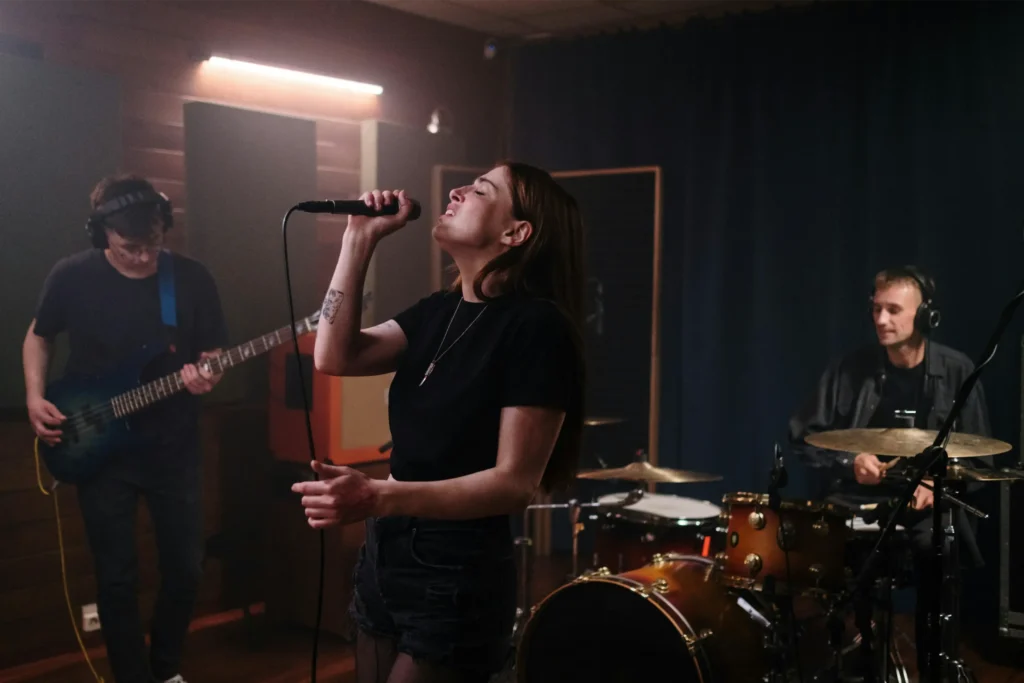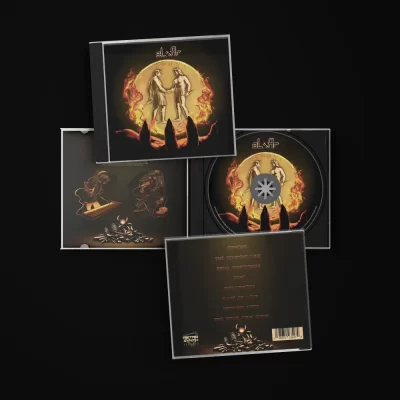There I was, vibing to the music of on of my favorite electronic radio shows while hanging out in the chat of the show itself: one good song after another until, at a certain point, everyone started writing about how “incredible” the song playing was.
“Incredible?” I asked myself “what does it have more compared to the previous ones?“
That’s until someone wrote, “Depeche Mode never disappoints“. It was the latest song from Depeche Mode, which I never heard before and, if no one ever told me it was from DP, I would have considered it exactly at the same level, if not inferior, to all the other independent ones that were playing in the show before that point.
And here lies a problem, which is in my opinion the biggest problem blocking small/independent musicians from actually having their music heard: the contrast between how the majority of people approach indie music versus megastars. There’s definitely an imbalance in how we perceive and judge musical works depending on their origins or scale of fame.
There is an inherent inclination within us to hold indie creations under a microscope, searching for imperfections, at times even making up some because we are looking for them (damn I’ve had different so-called “music pros” criticizing elements in our songs that weren’t in the song itself cause their mind just “made them up”, stuff like “the delay at minute tot is bad, on songs that had no delay in), expect them to be there, while turning a blind eye to flaws in more established artists’ productions.
What we’ll be talking about today is an uncomfortable truth that’s extremely to the advantage of big music labels and totally to the disadvantage of small artists: when we listen to music from little-known musicians, 90% of the time we do so with a criticizing mindset, to hear the flaws, the mistakes, instead of just listening to it “to enjoy it“, the same way we do with established names.
This means that, no matter how good what we’re hearing is, in a big majority of time we’ll find or create flaws in what the lesser-known proposes, while totally overvaluing what the established names place in front of us.

Why Do We Critique Indie Music More?
Perception, in its broadest sense, refers to the way we interpret and make sense of the world around us. It involves how we use our senses – such as sight, sound, touch, taste, and smell – to gather information from our environment and then process that information in order to form a coherent understanding of what is happening.
Our perceptions are influenced by a variety of factors including past experiences, emotions, beliefs, biases, culture, and personal preferences. As a result, different people can perceive the same situation or stimuli in different ways.
Perceptions play a pivotal role in how we critique indie music versus major artists and one of the main psychological elements that influence it, is “social proof“
Social Proof refers to the phenomenon where individuals assume the quality of a product or an action depending on how many other people “enjoy” that product or perform a given action. In simpler terms, people tend to follow what others are doing because they believe it is the right thing to do. This concept is often used in marketing and psychology to influence/manipulate consumer behavior by showcasing positive feedback, testimonials, endorsements, or statistics that suggest popularity or credibility. Businesses utilize social proof as a persuasive tactic to build trust and encourage potential customers to make purchasing decisions based on the experiences of others.
When a new indie artist releases music, it will not receive the same initial attention or praise as a major artist’s release. This is due in part to the concept of social proof that tells our brain that “unknown” means “no people follow/enjoy it” so “it’s not that good“.
All of this happens in a totally subconscious way mind you.
Major artists often benefit from an established fan base and extensive marketing efforts, which can create an aura of popularity and quality around their music. In contrast, indie artists may struggle to gain visibility and credibility in a crowded market where social proof plays a significant role in shaping consumer behavior.
As listeners, we are influenced by what others are listening to and enjoying. If our friends recommend a song by a major artist, we are more likely to give it a chance compared to an unknown indie artist. This bias can impact how we perceive the quality and value of music based on its popularity rather than its actual merit.
Flawed, Enjoyable, Bad, Perfect... None is Real
Reflecting on the “Flaws” Double Standard in Music Critique opens a window into the intricate dynamics that influence our perception of musical imperfections. It’s intriguing how indie music often receives heightened scrutiny, while those from major artists tend to be more forgivingly glossed over if not completely overlooked.
This phenomenon highlights an imbalance in how we evaluate music based on the artist’s stature rather than solely focusing on the art itself. For instance, a small independent band might face harsh criticism for some artistic choices that, were they made by a worldwide established name, would be perceived as “revolutionary to the music world, throwing away the standard to concentrate on raw emotions”.
Familiarity and reputation play significant roles in shaping our tolerance for musical imperfections. The more accustomed we are to an artist and their level of success, the more likely we are to overlook or normalize any flaws present in their work. This ingrained bias can unknowingly seep into our critique processes, where preconceived notions about an artist’s brand may cloud our objectivity.
This mechanism is even more highlighted when the one judging is an “artist” that managed to get a little recognition and find him/herself valuing the world of people behind them: the chance to pass judgment based only on an overvaluation of their own work by criticizing everything that does not follow the same rule and is made differently becomes EXTREMLY high in these kinds of situations.
The relatability factor and personal connection we may feel toward indie acts often lead us to approach their music with heightened sensitivity and critical lenses. In contrast, when assessing major artists’ output, there is a predisposition to view their work through rose-tinted glasses shaped by societal perceptions of success.

Fostering Appreciation for Indie Artistry
I often think that if I had the money, I would create a different kind of music streaming service that would take away everything “visual”.
No more pictures of half-naked ladies on cover art, no more brand elements, no more flashy colors: just music, and the ability for the listener to either like it or dislike it. Then, depending on what a listener likes, more music from whoever created the music he/she enjoyed and from similar artists would be presented to them.
One thing I am sure of is that by taking away all the elements that influence and manipulate the listener’s perception of the presented music, the gap between independent/small artists and big renewed ones would drastically decrease and that would be a great thing for the music world as a whole, even if very bad news for the “music industry”, which differs greatly from the “music world”.
This is not going to happen tho, especially since people would refuse such a platform very harshly since they would not be able to voluntarily give up on their “fanatic status” (let’s all remember that the word “fan” stands for “fanatic”) in relation to all those superstars that have been implanted into their heard by manipulative marketing teams all around the world so we should probably give up on this dream and find ways to control our behaviors in this regard.
We all should approach indie music with an open mind and a non-judgmental perspective. We should strive to embrace its creativity and uniqueness. Imagine stepping into an art gallery filled with diverse paintings – each stroke tells a story, each color choice evokes emotions. Similarly, indie musicians pour their hearts into their craft, bearing their souls through melodies and lyrics deserving of attentive ears rather than quick criticism.
Supporting independent musicians involves more than just recognizing errors in their compositions; it entails championing their passion and dedication towards creating music that challenges norms and inspires change.
Moreover, highlighting the importance of appreciating indie artistry goes hand in hand with understanding the stories behind the music. Consider how listening to an independently released album feels like unraveling a beautifully wrapped gift – each track unveiling layers of vulnerability, resilience, and unfiltered emotions from the artist’s own experiences. It’s about forging a connection beyond surface-level critiques and embracing the imperfections as part of what makes indie music so profoundly human. In doing so, we not only show respect for the art form but also demonstrate empathy towards those who dare to bare their souls through melody and verse in a world driven by fleeting trends and commercial interests.
I believe it’s time to embark on a journey toward a more balanced and equitable evaluation process for all artists, regardless of their popularity or genre categorization. This shift isn’t solely about giving indie musicians a fair chance but rather about recognizing and appreciating artistic merit across the board.
Imagine a world where a poignant lyric or an innovative musical arrangement is valued as much in indie tracks as it is in chart-topping hits. By challenging existing biases in music journalism and reviews, we can strive to create a space where creativity and genuine talent are celebrated without being overshadowed by preconceived notions of what success should look like. It’s about redefining the parameters through which we evaluate artistry, allowing both indie and major artists to stand on equal ground when it comes to critical analysis.
Let’s break free from the constraints of conventional norms that dictate how we perceive music based on how much we know or do not know a certain artist or how much their music satisfies the standards we either self-imposed or someone else created for ourselves.
By adopting a more open-minded approach to musical critique, we not only empower independent artists but also enrich our own listening experiences. It’s time to recognize that great music transcends boundaries – whether commercial or underground – and deserves to be appreciated for its inherent value rather than its place on the charts. In essence, fostering equity in musical critique isn’t just about fairness; it’s about honoring the diverse voices and expressions that make up the colorful tapestry of our musical world.
Conclusion: Rethinking Our Approach to Music Criticism

As I ponder the disparity between the critique of indie music versus major artists, I can’t help but wonder if we’re missing out on appreciating a world of talent just because it hasn’t reached mainstream popularity.
The journey through this exploration has been eye-opening, revealing how societal norms influence our perceptions and critiquing habits in the realm of music. It’s time to challenge ourselves to break free from these preconceptions and biases, opening our ears and hearts to the diverse creativity that both indie and mainstream artists have to offer.
In reimagining our approach to music criticism, let’s strive for a more equitable landscape where artistic merit is valued regardless of an artist’s scale of fame or genre. By fostering an environment that celebrates authenticity, creativity, and uniqueness without undue scrutiny or bias, we can truly honor the artistry that exists across all spectrums. So here’s to embracing a future where both indie musicians and major artists are judged on the same scales of passion, skill, and innovation — may our ears be open to the beauty in all kinds of music waiting to be heard.




